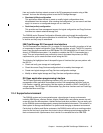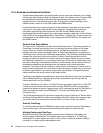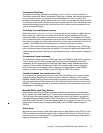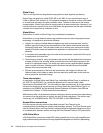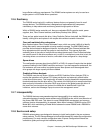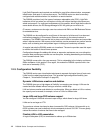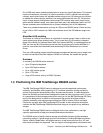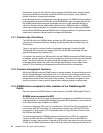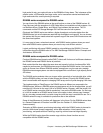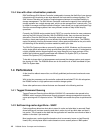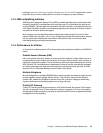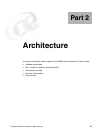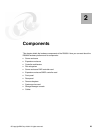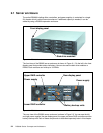Chapter 1. Introducing the IBM TotalStorage DS6000 series 17
high cache hit rate, your cache hit rate on the DS6800 will drop down. This is because of the
smaller cache. z/OS benefits from large cache, so for transaction-oriented workloads with
high read cache hits, careful planning is required.
DS6000 series compared to DS8000 series
You can think of the DS6000 series as the small brother or sister of the DS8000 series. All
Copy Services (with the exception of z/OS Global Mirror) are available on both systems. You
can do Metro Mirror, Global Mirror, and Global Copy between the two series. The CLI
commands and the DS Storage Manager GUI look the same for both systems.
Obviously the DS8000 series can deliver a higher throughput and scales higher than the
DS6000 series, but not all customers need this high throughput and capacity. You can choose
the system that fits your needs since both systems support the same SAN infrastructure and
the same host systems.
It is very easy to have a mixed environment, with DS8000 series systems where you need
them and DS6000 series systems where you need a very cost efficient solution.
Logical partitioning with some DS8000 models is not available on the DS6000. For more
information about the DS8000 refer to The IBM TotalStorage DS8000 Series: Concepts and
Architecture, SG24-6452.
DS6000 series compared to DS4000 series
Previous DS4000 series (formerly called FAStT) clients will find more of a difference between
the DS4000 series and DS6000 series of products.
Both product families have about the same size and capacity, but their functions differ. With
respect to performance, the DS4000 series range is below the DS6000 series. You have the
option to choose from different DS4000 models, among them very low cost entry models.
DS4000 series storage systems can also be equipped with cost efficient, high capacity Serial
ATA dr ives.
The DS4000 series products allow you to grow with a granularity of a single disk drive, while
with the DS6000 series you have to order at least four drives. Currently the DS4000 series
also is more flexible with respect to changing RAID arrays on the fly and changing LUN sizes.
The implementation of FlashCopy on the DS4000 series is different as compared to the
DS6000 series. While on a DS4000 series you need space only for the changed data, you will
need the full LUN size for the copy LUN on a DS6000 series. However, while the target LUN
on a DS4000 series cannot be used for production, it can on the DS6000 series. If a real copy
of a LUN is needed on a DS4000 series, there is the option to do a volume copy. However,
this is a two step process and it can take a long time until the copy is available for use. On a
DS6000 series the copy is available for production after a few seconds.
Some of the differences in functions will disappear in the future. For the DS6000 series there
is a General Statement of Direction from IBM (from the October 12, 2004 Hardware
Announcement):
Extension of IBM's dynamic provisioning technology within the DS6000 series is planned to
provide LUN/volume dynamic expansion, online data relocation, virtual capacity over
provisioning, and space-efficient FlashCopy requiring minimal reserved target capacity.
While the DS4000 series also offers remote copy solutions, these functions are not
compatible with the DS6000 series.



